Accord Hybrid vs. severe cold in novelty duel
Filed under: Weekly test drives, Autos
By John Gilbert
The novelty has worn off. Living in the Great White North of Duluth, Minnesota, is almost always fulfilling, but after two weeks of daily temperatures of, say, 22 below actual and 39 below windchill, and notifying our friends and relatives living elsewhere of such extremes, we’ve have enough. The saving grace for me is that it was a great time to evaluate the severe-cold worthiness of the 2021 Honda Accord Hybrid.
As we hurtle toward a future of electric cars, soonere rather thn later, there is one serious issue still to be solved for vehicles powered by electric power, and that is severe cold, which tends to drain the power from battery packs, and in cars can greatly reduce the driving range of electric power. It affects camera batteries, and it cuts down the range of function of the late and comparatively unlamented Chevrolet Volt, which saw its range drop from mid-20s to mid-teens before the gasoline engine would have to take over.
While we await the sooution for electric cars in the cold, hybrid cars, which have a limited pure-electric range but can be recharged via the affiliated gasoline engine, make a lot of sense. The 2021 Accord is typical Honda, with striking appearance and features and a choice of power. You can get asimple and strong gas engine version, a 1.5-liter turbo 4-cylinder with a hybrid, or the third alternative of a 2.0-liter 4 coupled with the Honda hybrid system. Door No. 3 was the one we opened for a grigid week of driving.
The 2.0-liter 4-cylinder stands at an adequate if not racy 143 horsepower, and the boost from the hybrid electric system lifts that tally to 212 horsepower. That is more than enough to whisk the Accord along in a sporty fashion. The transmission in the test car was a CVT, the somewhat boring “one-speed” systdem of internal pulleys that keep the revs the same and increase the constantly varying transmission to meet demands of your right foot.
I am not a fan of CVTs, but Honda has an interesting way to make them satisfying, which is to offer steering wheel paddles to manually control shift points if you so choose, using the right paddle to improve the ratio upward, or the left paddle to squeeze it to a lower range — almost making it feel like a normal automatic transmission. Much more fun to drive, I think.
The week I had the Accord Hybrid to test, the temperature never rose as high as zero. Think about that. It dropped to nasty minus numbers overnight as something called a Polar Vortex circled down from northern Manitoba as far as central Wisconsin, then circled back up over Lake Superior and rejoined the seemingly endless cycle somewhere above my home on the North Shore. It was sort of like keeping track of the Daytona 500 without the crashes, when they just went around and around, reloading with frigid air to bring back our way on the next lap.
The weather guys on television went haywire, making me certain many of them were not from Duluth and couldn’t believe their good fortune at having such extremes to tell us about breathlessly as their work grew to three or four segments on the half-hour 10 o’clock nightly newscast. After they told us how cold it was all across Northern Minnesota, then — ta-da! — they could tell us about the windchill!
At our house, located up on a hill above the North Shore of Lake Superior, the nastiest I saw on our thermometer as we entered February 2021 was 23 below overnight, with a windchill of 39 below. Up near the Boundary Waters Canoe Area, nearer the Canadian Border, the temperature hit 50 below one night in Ely, Minnesota, causing one rookie weather guy to claim that was a windchill reading, when it was an actual temperature. We don’t really know what its windchill was.
What I will tell you was that the Accord was a worthy companion, parked outside in that setting. It looked fantastic in pure white metallic with a lot of highlights reflecting the bright sun that shown down from beautiful blue skies every day, defying logic by producing absolutely no appreciable heat. Still, it was fitting to have a white car on the white ice driving past fields of white snow. To do that, of course, you have to start the car, and for that I am eminently thankful for auto-start. A push-button feature on the key fob, so once you’ve locked the doors from the fob, you to push a special button and the car blinks at you briefly to notify you that it got your message and yes, it will start its engine.
A few minutes later, you have your hooded sweatshirt on under your down parka and your warm gloves, and you trudge out to the driveway reminiscing, perhaps, about being a kid in the same vicinity and listening to the radio renditions of “Sergeant Preston of the Yukon,” where the intrepid Mountie used dogsleds to catch the bad guys all across Canada’s version of Minnesota. It’s only a few seconds until you’ve unlocked the Accord and climbed in, thankful that if you left the heater and fan blowing, it will resume with the auto-start, making it not bad inside.
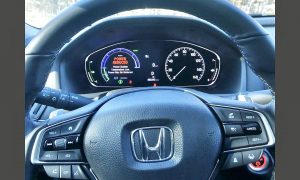
Pay attention to uyour instruments, including the changing panel to alert you to cold-affected power in the battery pack.
On the instrument panel, the left-side gauge can be changed to give you all sorts of information, including a message on the coldest mornings that said, in red: “Power Reduced,” and adds that because of low temperature, the power may be reduced until this baby warms up. That means, until the electric part of the hybrid gets warmed up to full function, I would guess.
The heater took its time blowing sufficient heat, but the seat-heaters came through admirably until everything got functional. Power for driving was excellent, on Duluth’s steep avenues or on the level East-West streets. The bucket seats were excellent and while we didn’t use the back seat, room was spacious on the classy leather seat coverings.
The Accord Hybrid we test drove was loaded with enough options to boost the price up to nearly $40,000, but the car — which has maintained a position among the top-selling midsize favorite purchases — has evolved into a near-luxury vehicle that can challenge Honda’s own Acura upscale sedans for looks and features.
This car had everything, from lane-departure alert and warning to full back-up camera and front and rear parking assistance. Another feature of severe winter driving is that the tires tend to feel like they might be square when you drive on uneven pavement, but the Accord suspension was smooth and the car took the roughest sections without harshness. We even took a drive up the North Shore to gaze out over the serious blue water of Lake Superior as we headed up to Castle Danger and our favorite Rustic Inn restaurant, which has opened for limited seating, but not limited pie, during the pandemic.
You would think that maybe the severe cold might prevent COVID-19 from surviving in the area, but no such luck.
On another day, as we drove downtown from our house, we were startled to see dozens of dark objects out on the ice that blanketed Lake Superior out from our shore across to Wisconsin. Most of the big lake is still open water, but at the western arrow-like tip of the big lake, it was all iced over, and almost immediately it was sprinkled with ice-fishing houses. You can’t stop those intrepid ice-fishermen, who have amazingly efficient portable ice-fishing houses they set up in seconds to offer shelter against the bone-chilling cold while they drill their holes and watch their lines deliver everything from walleyes, to lake trout, to steelheads, to herring, and maybe even a wayward salmon. We just weren’t sure the ice had been in place long enough to be secure.
We drove by the other way, and they were still out there, and while protecting occupants from bone-chilling cold it might be more accurate to say they protect them from bone-chilling winds. They still are sitting on a giant ice sheet and the term “bone-chilling” prevails unless they also have a space heater.
The next morning we heard the news: A few of those ice fishermen sitting in their dark tent-like huts heard a strange cracking sound and when they looked out, not unlike Puxatawny Phil, they were properly horrified to see open water where ice used to be. Quite a wide swath of it, and getting wider. One fellow acted quickly and made an Olympic-style leap to make it back to the “mainland” ice, but 27 others, complete with their fishing equipment and ice houses, were being blown by the just-changed westerly winds up the shore, toward Two Harbors.
It took a Fire Department rescue crew, DNR folks, Coast Guard and police to act promptly and take some small inflatable boats out to rescue all 27 of them, bringing them back two at a time until all of them were safe. One asked what about the thousands of dollars of expensive fishing gear, and some were allowed to get their own boats and chase the still-moving ice floe to retrieve their gear.
They could have waited for the wind to shift again, which it did, and when it came blowing out of the northeast, the big ice floe sailed back toward Duluth, smacking into the existing ice and buckling into large and artistic geometric shapes of ice. It is an occasional treat for those of us who might otherwise be wondering why we haven’t left the Great White North for Arizona, where there are actual clubs of expatriate Minnesotans who gather and wear sweaters when the temperature dips to 60. Above.
The Accord Hybrid fuel economy dipped down into the 20s if we warmed it up a bit each time we went out, but it has EPA estimates of up to 48 miles per gallon, both in city driving and combined operation, and just slightly less on the highway.
In its never-ending duel with Toyota’s Camry and facing new challenges from the likes of South Korea’s Hyundai Sonata — which also has a fantastic hybrid — the Accord holds its prestigious place up among the most desired and most owner-satisfying vehicles available anywhere.
And while we still are unsure how much range might be reduced from a pure EV (Electric Vehicle), we do know that a good hybrid not only relieves us of such “range anxiety,” but also can be tuned in contemporary form to have the electric power bolster the gas engine for a horsepower boost. And that will more than suffice while manufacturers such as Honda figure out how to move us to the next level of pure electric, seamlessly.
For now, I’ll take a hybrid. With seat heaters and auto-start.
Winter storm? You need a Defender
Filed under: Weekly test drives, Autos
By John Gilbert
It was completely appropriate that when a newly reborn 2021 Land Rover Defender was delivered to our home just outside Duluth, Minnesota, just as we were hit by a heavy snowstorm. It has been a weird winter on the North Shore of Lake Superior, with few storms, but most of them nasty, often with high winds followed by thermometer plunges.
To take on this particular storm we needed something to defend ourselves with, and what could be better than something named “Defender?”
The Defender has a rich history in the annals of Land Rover, although its role became obsolete when the company came out with all sorts of new models. So for its return, after a 23-year absence, Defender gets a very classy, contemporary restyling. Gone are the squarish corners that immediately identify Land Rovers and Range Rovers. Smoothly rounded corners make the new Defender look less rugged and more sophisticated. But I was reluctant to go driving off into the unplowed roadways because I didn’t want to mess it up, particularly after the car-wash reopened and took care of all the road glop to display a subtle, almost-pastel green color called Panges Green.
Then I realized that the Defender had been gone for all those years, without ever losing its familiarity — or its reputation. As a Land Rover, and not a Range Rover, the Defender was always aimed at adventurers who intended to use it to go anywhere, over and through any obstacles. It is the personification of the reason I first described Land Rovers as the vehicle you would choose if you had to drive to Hudson Bay — without using any roads.
The price is way up there — a base of $63,000 for the Defender SE model, and an as-tested sticker of $72,180. That is a lot, but it is less than loaded versions of, for example, a Cadillac Escalade, a GMC Yukon, a Ford Expedition, Lincoln Navigator and other luxury SUVs I’ve recently tested. And while it’s out of my price range, driving it for a week in “all terrain” Northern Minnesota roadways, I must say it has the substance to justify its price tag.
Two of the most prestigious names in sport-utility vehicles — dating back to well-before the trendy “SUV” catch-phrase came along — are Range Rover, and Land Rover. And both of them are from the same company, a proud British manufacturer that over-engineered its vehicles for use in wartime or peace, for work or pleasure, and only belatedly for being the classic luxury family hauler of the wealthy.
The company is Land Rover, and it makes a fleet of different Range Rovers, which meet all sorts of different objectives of class and luxury. The over-engineered trait is well-documented. The first Range Rover I ever drove was a few decades ago, and I learned that while it was shaped in a sort of squarish motif, it housed a remarkable living space of rich leather, with real wood and real metal trim. Just sitting in a Range Rover meant you found immediate strength and luxury.
It wasn’t until later that I learned the structure underneath Range Rovers was over-built for ruggedness, with frame rails that resembled structural girders. The least-qualified Range Rovers were still substantially built, and the equation also went the other way — the most hardy Land Rovers built to challenge the roughest terrain were also awash in luxury features.
British motor companies have fallen on difficult times, but Land Rover, and its British cousin, Jaguar, survived by finding benefactors who could finance their stubborn determination to build their vehicles to their own demands. Those first Land Rovers and Range Rovers I drove had aluminum V6 engines bought from Buick. Now, after the pair were jointly purchased and fionanced by Tata Motors in India, Jaguar makes outstanding sedans and sports cars and engines, and Land Rover makes its uncompromising SUVs and they’ve gained the high-tech engines from Jaguar.
The Defender is offered with either a high-output 2.0-liter 4 cylinder or, in the case of my test vehicle, a 3.0-liter in-line 6, that is turbocharged for high-end power, and awarded fantastic low-end torque via an electric supercharger that gets you up into the turbo’s range. In the Defender, I had the 3.0 in-line 6, and it produces 395 horsepower and 406 foot-pounds of torque in a range from 2,000 to 5,000 RPMs.
The engine is also equipped with a 48-volt motor-generator that brings the slick engine up to contemporary standards of the newest hybrid concepts of bolstering engine output instead of only improving fuel economy.
The Defender’s 8-speed ZF transmission worked smoothly and sent the 5,700-pound vehicle on its way swiftly. We got about 18.7 miles per gallon mostly in town or scaling the steep snowbound avenues of Duluth. I didn’t have to use the low-range transfer case, but a simple knob can easily switch you to full lock-up, or for whatever type of terrain you are hoping to conquer.
Land Rover did it right when it brought back the Defender, replacing the old truck-like body on frame platform for a new unibody design made mostly of aluminum, and they could do any tricks they wanted to with the suspension. The upscale SE model came with adaptive air suspension, the twin-speed transfer case for the all-wheel drive adds a terrain-response system with selectable driving and terrain modes, including off-road for whether you’re scaling boulders or making your way through ruts, controlling hill descent, or splashing through water up to 35.4 inches of depth.
The entire vehicle can be raised or lowered if you have nasty ruts ahead, and it has 11.5-inch clearance underneath. It also has a 38-degree approach angle and 40-degree departure angle without scraping those stylish body panels. All the latest safety features — lane recognition, lane-keep assist, electronic traction control, dynamic stability control and roll stability control, blind spot assist, driver condition monitor, emergency brake assist, adaptive cruise control with speed limiter, 400-watt Meridian audio system, and 360-degree monitor on the large navigation screen, are at your command.
The Defender drives smoothly on tires mounted on 20-inchalloy wheels, feeling like a boulevard cruiser without hinting that it would prefer to go charging off the road and tackle the boulders, woods and other terrain on either side.
My experience through the years with Land Rover includes some of the most fantastic introductory trips they could dream up. I attended a launch of the Discovery in Iceland, where we drove around the country on the one highway that circumnavigates the glaciers and volcanoes of that chilly paradise. They made sure we were warmly clad in special parkas made in Iceland for Iceland, and I hesitated to tell anyone that on that memorable week in January, it happened to be colder in Minnesota!
We also experienced a specific company made and company owned off-road course in Quebec. Another highlight remains unforgettable when we drove up into the Rocky Mountains to the Continental Divide, requiring some breathtaking trails best-suited for mountain goats or mules — but not humans, and certainly not motor vehicles.
Having experienced such ventures, I fully accept the intentions of all the details on the Defender’s price sticker as valid. The fact that the Defender would do all those things better than its Range Rover siblings is impressive, but now you add a third row of seats for kids and the ability to haul seven to the shopping center or on a trip — preferably after we get past the pandemic.
Firm comfort from the supportive seats and luxury that’s never ostentatious makes a welcoming interior, as expected from such a proud and demanding British manufacturer.
We can welcome back the Defender, because the new one not only will conquer every imaginable challenge, it also will be the Defender of Land Rover’s rich heritage. And you never know when you might want to take a trip to Hudson Bay without using any roads.


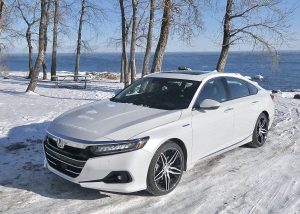
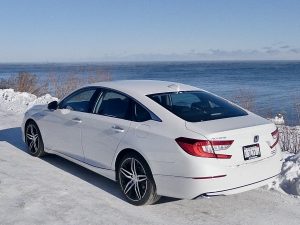
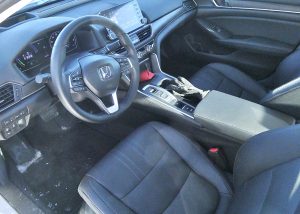
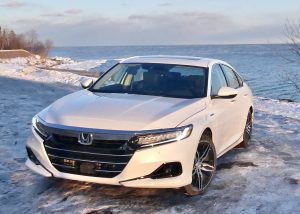
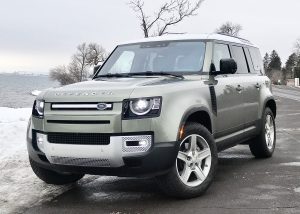
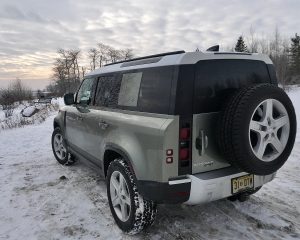
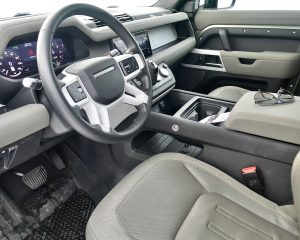
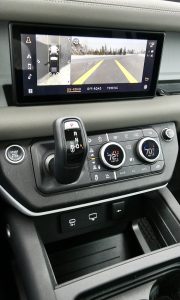
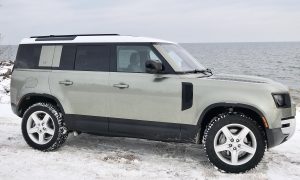
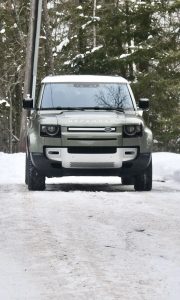
 John Gilbert is a lifetime Minnesotan and career journalist, specializing in cars and sports during and since spending 30 years at the Minneapolis Tribune, now the Star Tribune. More recently, he has continued translating the high-tech world of autos and sharing his passionate insights as a freelance writer/photographer/broadcaster. A member of the prestigious North American Car and Truck of the Year jury since 1993. John can be heard Monday-Friday from 9-11am on 610 KDAL(www.kdal610.com) on the "John Gilbert Show," and writes a column in the Duluth Reader.
John Gilbert is a lifetime Minnesotan and career journalist, specializing in cars and sports during and since spending 30 years at the Minneapolis Tribune, now the Star Tribune. More recently, he has continued translating the high-tech world of autos and sharing his passionate insights as a freelance writer/photographer/broadcaster. A member of the prestigious North American Car and Truck of the Year jury since 1993. John can be heard Monday-Friday from 9-11am on 610 KDAL(www.kdal610.com) on the "John Gilbert Show," and writes a column in the Duluth Reader.